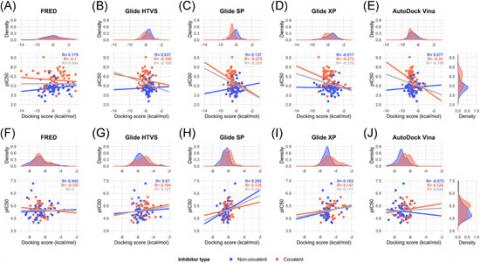Haste makes waste: A critical review of docking-based virtual screening in drug repurposing for SARS-CoV-2 main protease (M-pro) inhibition

Macip G, Garcia-Segura P, Mestres-Truyol J, Saldivar-Espinoza B, Ojeda-Montes MJ, Gimeno A, Cereto-Massagué A, Garcia-Vallvé S, Pujadas G, This review makes a critical evaluation of 61 peer-reviewed manuscripts that use a docking step in a virtual screening (VS) protocol to predict SARS-CoV-2 M-pro (M-pro) inhibitors in approved or investigational drugs. Various manuscripts predict different compounds, even when they use a similar initial dataset and methodology, and most of them do not validate their methodology or results. In addition, a set of known 150 SARS-CoV-2 M-pro inhibitors extracted from the literature and a second set of 81 M-pro inhibitors and 113 inactive compounds obtained from the COVID Moonshot project were used to evaluate the reliability of using docking scores as feasible predictors of the potency of a SARS-CoV-2 M-pro inhibitor. Using two SARS-CoV-2 M-pro structures and five protein-ligand docking programs, we proved that the correlation between the pIC50 and docking scores is not good. Neither was any correlation found between the pIC50 and the ∆G calculated with an MM-GBSA method. When a group of experimentally known inactive compounds was added, neither the docking scores or the ∆G were able to distinguish between compounds with or without M-pro experimental inhibitory activity. Performances improved when covalent and noncovalent inhibitors were treated separately, but were not good enough to fully support using a docking score as a cutoff value for selecting new putative M-pro inhibitors or predicting the relative bioactivity of a compound by comparison with a reference compound. The two sets of known SARS-CoV-2 M-pro inhibitors presented here could be used for validating future VS protocols which aim to predict M-pro inhibitors.
Medicinal research reviews,
2021
Pubmed: 34697818
Direct link: 10.1002/med.21862
